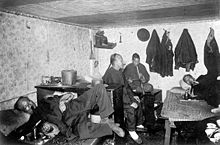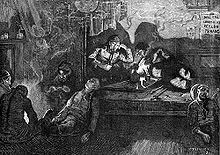- Opium den
-
For other uses, see Opium Den (disambiguation).
An opium den was an establishment where opium was sold and smoked. Opium dens were prevalent in many parts of the world in the 19th century, most notably China, Southeast Asia, North America and France. Throughout the West, opium dens were frequented by and associated with the Chinese, because the establishments were usually run by Chinese who supplied the opium as well as prepared it for visiting non-Chinese smokers. Most opium dens kept a supply of opium paraphernalia such as the specialized pipes and lamps that were necessary to smoke the drug. Patrons would recline in order to hold the long opium pipes over oil lamps that would heat the drug until it vaporized, allowing the smoker to inhale the vapors. Opium dens in China were frequented by all levels of society, and their opulence or simplicity reflected the financial means of the patrons. In urban areas of the United States, particularly on the West Coast, there were opium dens that mirrored the best to be found in China, with luxurious trappings and female attendants. For the working class, there were also many low-end dens with sparse furnishings. These latter dens were more likely to admit non-Chinese smokers.[1]
Contents
San Francisco
Opium smoking arrived in North America with the large influx of Chinese who came to participate in the California Gold Rush. The jumping-off point for the gold fields was San Francisco, and the city's Chinatown became the site of numerous opium dens soon after the first Chinese arrived around 1850. By the 1870s, San Francisco's opium dens attracted non-Chinese residents, and the problem of opium addiction was acknowledged by the city at large. In 1878, the city of San Francisco passed its first anti-opium ordinance. In the early 20th century, huge bonfires, fueled by confiscated opium and opium paraphernalia, were used to destroy opium and create a public venue to discuss opium use. Due to opium-eradication campaigns, smoking opium was driven underground and was still fairly common in San Francisco and other cities in North America until around World War II. A typical opium den in San Francisco might be a Chinese-run laundry that had a basement, back room, or upstairs room that was tightly sealed to keep drafts from making the opium lamps flicker or allowing the tell-tale fumes of opium escape. A photograph of one luxurious opium den in 19th-century San Francisco has survived, taken by I. W. Taber in 1886, but the majority of the city's wealthy opium smokers, both Chinese and American, shunned public opium dens in favor of smoking in the privacy of their own homes.[2]
New York
The opium dens of New York City's Chinatown, due to its geographical distance from China, were not as opulent as some of those to be found on the American West Coast. According to H. H. Kane, a doctor who spent years studying opium use in New York in the 1870s and 1880s, the most popular opium dens (or "opium joints" as they were known in the parlance of the day) were located on Mott and Pell streets in what is still Manhattan's Chinatown. At the time, all the city's opium dens were run by Chinese, except for one on 23rd Street that was run by an American woman and her two daughters. Kane remarked that New York's opium dens were one place "where all nationalities seem indiscriminately mixed". As in San Francisco, New Yorkers of all races would come to Chinatown to patronize its opium dens. New York City's last opium den was raided and shut down on June 28, 1957.[1][3][4]
Canada
Chinese immigrants first established Chinatowns in Victoria and Vancouver in British Columbia, and here too, opium dens were common in the late 19th and early 20th centuries. When the city of San Francisco began taxing imported opium for smoking, the trade was diverted to Victoria, and, from there, much of the opium was smuggled south into the United States. However, a fair amount of opium was consumed in the opium dens to be found in the Chinatowns of Victoria and Vancouver. The latter city's "Shanghai Alley" was known for its rustic opium dens. As in the United States, non-Chinese often frequented the Chinese-run opium dens in Canadian Chinatowns.[5]
France
Unlike the opium-smoking scene in North American cities, opium smoking in France was introduced for the most part by French expatriates returning home from stints in their Indochinese colonies. By the early 20th century, there were numerous opium dens in France's port cities, particularly Toulon, Marseille and Hyères.[6]
London
Victorian London's reputation as a center of opium smoking is quite unjustified and testifies to the power of literary fiction over historical fact. The London press, along with popular British authors of the day, were fond of portraying London's Limehouse district as an opium-drenched pit of danger and mystery. In fact, London's Chinese population never exceeded the low hundreds, in large contrast to the tens of thousands of Chinese who settled in North American Chinatowns. Yet, upon this tiny community was heaped notoriety for opium-induced sordidness and debauchery—the sole intent of which was to titillate and shock British readers. Interestingly, scholars have yet to unearth a single historical photograph of opium smokers in London—in marked contrast to the relative abundance of period photos depicting smokers in the United States, Canada and France.[7]
References in fiction
- Rudyard Kipling's short story "The Gate of a Hundred Sorrows" tells the history of a Chinese opium den in India.
- In Charles Dickens's final and uncompleted novel, The Mystery of Edwin Drood, an opium den is a critical element of the story.
- In the Sherlock Holmes story "The Man with the Twisted Lip" by Arthur Conan Doyle, Dr. Watson goes to an opium den in the East End of London to find Isa Whitney.
- In Oscar Wilde's novel, The Picture of Dorian Gray, Dorian visits the opium dens of London when indulging in the pleasures of life whether moral or immoral, subject to the influential character Lord Henry and his hedonistic outlook on life.[clarification needed]
- In Around the World in Eighty Days, Fix attempts to delay Fogg by giving Passepartout a pipe in a Hong Kong opium den.
- In The Mystery of Dr. Fu-Manchu (1913), Nayland Smith and Dr Petrie enter Singapore Charlie's Thames-side opium den in search of Dr Fu Manchu and his henchmen.
- In the 1923 Agatha Christie magazine short story The Lost Mine, Hercule Poirot is forced, much against his will, to conduct part of his investigation in a Limehouse opium den. The story appeared in book form in the American version of Poirot Investigates (1925) and in the UK in Poirot's Early Cases (1974).
- In Tennessee Williams' play, The Glass Menagerie, the main character Tom tells his religious mother that he goes to an opium den.
- In the The Adventures of Tintin story The Blue Lotus, the main character Tintin is involved in infiltrating opium dens.
- In the 1984 film Once Upon a Time in America, the character Noodles (Robert De Niro) frequents an opium den.
- In the graphic novel The League of Extraordinary Gentlemen, Mina Murray finds aged adventurer Allan Quatermain in an opium den. "Singapore Charlie's" den is the setting of their first encounter with the "Devil Doctor".
- In the film adaptation of From Hell the main character frequents opium dens.
- In the Simpsons episode Treehouse of Horror XV Ralph is shown smoking opium in an opium den
- In Philip Pullman's The Ruby in the Smoke, Sally is depicted fainting in an opium den
References
- ^ a b "Opium Museum". http://www.opiummuseum.com/index.pl?pics&67.
- ^ Commissioner Jesse B. Cook (1931-06). "San Francisco's Old Chinatown". San Francisco Police and Peace Officers' Journal. http://www.sfmuseum.org/hist9/cook.html. Retrieved 2007-09-22.
- ^ Nick Toches, M.D. (2000-09-01). "Opium Dens". http://www.vanityfair.com/culture/features/2000/09/opium-dens-200009?currentPage=all. Retrieved 2009-11-24.
- ^ H.H. Kane, M.D. (1881-09-24). "American Opium Smokers". http://immigrants.harpweek.com/chineseamericans/Items/Item061L.htm. Retrieved 2007-09-22.
- ^ Jane F. Murphy (1922). "The Black Candle". http://www.freeworldnews.com/frontmatter.html. Retrieved 2007-09-22.
- ^ "Opium degrading the French Navy". 1913-04-27. http://www.druglibrary.org/schaffer/history/e1910/frenchnavyopium.htm. Retrieved 2007-09-22.
- ^ Martin, Steven (2007). The Art of Opium Antiques. ISBN 9-749-51122-0.
External links
- Opium Museum
- Opium in the French Navy
- Limehouse debunked
- San Francisco Opium Den Photos circa 1889
- Scenes From an Opium Den - slideshow by Life magazine
Categories:- Drug culture
- Opium
Wikimedia Foundation. 2010.



